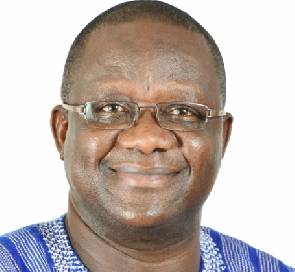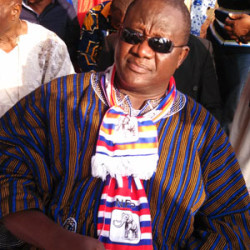 |
|
Paul Afoko (from Ghana Website) |
Ghanatta Ayaric
Paul Afoko
 |
|
Paul Afoko (from Ghana Website) |
When Meyer Fortes visited Sandema in 1934, he described the chief of the village as a young man who “stands about 6ft 4in.” (cf. Franz Kröger, Buluk 8, Extracts from the Diary of Sir Shenton Thomas, 1934). The Sandema chief referred to in that report was Afoko Ayieta, a senior brother of the longest ruling chief of Sandema, Azantilow Ayieta, whose long rule, imposing height and majestic walking are unparalleled in the history of chieftaincy in Ghana. Height runs in the Abil/Ayieta family of Sandema. Paul Afoko, the newly elected national chairman of the National People Party (NPP), and grandson of Chief Afoko, is a high tower in metaphorical terms, standing at about the same height as his grandfather and his uncles, Chief Azantilow, Abakisi and Akantigsi Afoko (opposition Member of Parliament for Bulsa in the First Republic). Had he been born and raised in the USA, Paul could easily have been a National Basketball Association (NBA) player matching the likes of Shaquille O’Neal if he had taken to that sport as a profession. That not being the case, Paul’s dunk shots are in the political field in Ghana. The man seems to be cut for leadership.
On 12th April 2014, he was elected National Chairman of the NPP at a congress held in Tamale,
polling 2,032 votes to beat his closest contestant, Stephen Ntim (1,500 votes) by a wide margin.
Paul’s victory was historic in the sense that he is the first person of Northern Ghanaian
extraction, a Bulsa, to occupy that highly enviable post in a party whose leadership is dominated
by people from Southern Ghana, mostly the Ashanti and Eastern Regions.

Mr. Paul Afoko was born on 31st August 1954. He had his elementary education at St. Mary’s Primary School, Navrongo, and Our Lady Middle School in Tamale. He attended Bawku Secondary school where he did his GCE ordinary level before continuing at Navrongo Secondary School for his Advanced Level School Certificate from 1974-1976 (Sixth form).
His interest in politics and his strong belief in democratic
governance started at an early age. During his student years he actively
campaigned against Acheampong’s Union Government idea.
And history documents a singular act of boldness on his part during the wee
hours of the Rawlings-led 31st December 1981 coup, which ousted the
democratically elected government of President Hilla Limann. While most
political heavyweights in the country hesitated coming out and openly condemning
the military takeover, the twenty-six year-old Paul, together with seven others,
were among the few who did not only condemn the coup but tried to mobilize
peaceful civil resistance against it. Paul went on a community radio station
(URA)
in
Bolgatanga, and urged people in his home Upper Region (then
including Upper West) to dare the machinery of the military government through
massive peaceful resistance by staying away from work. The group went on to
demonstrate against the coup on January 1st, 1982.
According to Alhaji Bature Iddrisu (who himself was a cadre of the Rawlings
revolution and who together with cadre-colleagues also staged counter
demonstrations in support of the coup), Rawlings, sensing danger in the
activities of Mr. Afoko and his group and the potential it had spreading to
other regions quickly dispatched troops from the 6th battalion of infantry at
Tamale to Bolgatanga to quell the unrest and arrest the leaders.
By the time the army arrived in Bolgatanga and following threats on his life
from supporters of Rawlings, Paul, together with the other leaders of the
rebellion, fled to neighboring Burkina Faso. He spent a few weeks in Ouagadougou
before being persuaded by his father, Mr. Francis Asianab Afoko, to return to
Ghana, in the hope that his son would be pardoned. Contrary to that expectation,
Paul was arrested on his return and detained without charge, first in police
custody in Bolgatanga then in Gondar barracks in Tamale and finally in Ussher
Fort Prison in Accra. After spending several months at Ussher Fort Prison, Mr
Afoko was released in 1983 when a group of non-commissioned soldiers led by
Corporal Alidu Giwa attempted toppling Rawlings and in the event stormed Ussher
Fort and released all the political prisoners there. Paul fled to the United
Kingdom where he was granted political asylum. While in the UK, he furthered his
education at the prestigious London School of Economics. He returned to Ghana in
2001 after the country had returned to civilian rule and he no longer faced the
risk of political persecution. He became a member of the NPP and remained one of
the party’s articulate firebrands in the area of communication until his
drafting into the National Council representing the Upper East Region.
His election to the post of national chairman of the party is the recognition of his mettle as an NPP leader capable of leading his party to victory in the general elections that will take place in 2016. Paul’s father was an NPP stalwart and a member of the Council of State in Kufour’s administration.
A financial analyst, successful businessman and one of the main sponsors of his party, the new NPP, Mr. Paul Afoko sees his immediate task as uniting an NPP, fraught with internal conflict, returning his party to power and moving the country’s economy forward. He is married and has four adult children, two daughters and two sons.